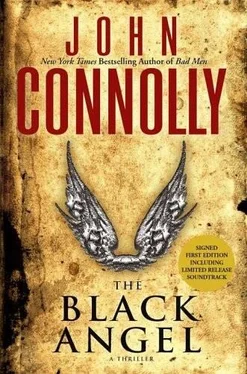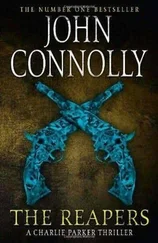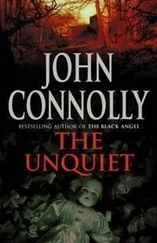“I’m sorry. I heard what happened.”
“I will miss him,” said Bartek. “I think I lived vicariously through his pleasures.”
I heard the jangling of chains. Claudia Stern started to scream, but I did not look.
“What will you do with her?”
“They called it ‘walling’ in medieval times. A terrible way to die, but a worse way not to die, assuming she is what she believes herself to be.”
“And there’s only one way to find out.”
“Unfortunately, yes.”
“But you won’t keep her here?”
“Everything will be moved, in time, and hidden once again. Sedlec has served its purpose.”
“It was a trap.”
“But the bait had to be real. They would sense it if the statue were not present. The pretence of its loss had to be maintained.”
Claudia Stern’s screams increased in intensity, then were suddenly silenced.
“Come,” said Bartek. “It’s time to leave.”
We stood in the churchyard. Bartek knelt and brushed snow from a headstone, revealing a photograph of a middle-aged man in a suit.
“There are bodies,” I said.
Bartek smiled.
“This is an ossuary, in a churchyard,” he said. “We will have no trouble hiding them. Still, it’s unfortunate that Brightwell did not survive.”
“I made a choice.”
“Martin was afraid of him, you know. He was right to be. Did Brightwell say anything before he died?”
“He promised that he’d find me.”
Bartek placed his hand upon my right arm and squeezed it gently.
“Let them believe what they will believe. Martin told me something about you, before he died. He said that if any man had ever made recompense for his wrongs, no matter how terrible they were, it was you. Deserved or not, you’ve been punished enough. Don’t add to it by punishing yourself. Brightwell, or something like him, will always exist in this world; others too. In turn, there will always be men and women who are prepared to confront these things and all that they represent, but in time, you won’t be among them. You’ll be at rest, with a stone like this one above your head, and you’ll be reunited with the ones that you loved and who loved you in return.
“But remember: to be forgiven, you have to believe in the possibility of forgiveness. You have to ask for it, and it will be given. Do you understand?”
I nodded. My eyes were hot. I dredged up the words from my childhood, from dark confessionals inhabited by unseen priests and a God who was terrible in His mercy.
“Bless me, Father, for I have sinned…”
The words spilled out of me like a cancer given form, a torrent of sins and regrets purging themselves from my body. And in time, I heard two words in return, and Bartek’s face was close to mine as he whispered them in my ear.
“Te absolvo,” he said. “Do you hear me? You are absolved.”
I heard him, but I could not believe.
Through these years I’ve seen days that I won’t miss at all,
but then God knows I’ve been as high as the sun.
Through it all you kept me warm,
holding on to my hand,
but now you’re on your own.
– Pinetop Seven, “Tennessee Pride”
The days fall like leaves. All is quiet now.
The marsh grass is blackened, and when the wind blows from the southeast it carries with it the smell of smoke. Someone found the charred body of a mute swan floating in the water, and the burned remains of shrews and hares have been discovered in the charred undergrowth. The dog no longer likes to venture where the fire burned, and so the twin boundaries of his world are represented by events from the recent past: flames rising where no flames should have been, and a deformed man drowning slowly in a pool of bloodied water as a pregnant woman watches him die.
I traced the young prostitute named Ellen to Tenth Avenue, just a couple of blocks from Times Square. After the death of G-Mack, I heard that she’d been taken under the wing of a new pimp, a middle-aged serial abuser of women and children who called himself Poppa Bobby, and liked his girls to call him Poppa or Daddy. It was after midnight, and I watched single men hover around the street girls like hawks circling wounded prey. Natives drifted past the hookers, by now immune to such sights, while late-night tourists darted uneasy looks at them, the glances of the men perhaps lingering for a moment too long before returning to the street ahead or the faces of their partners, a little moisture falling softly and secretly upon the seeds of their discontent.
Ellen was different now. Before, she had maintained a veneer of toughness and carried herself with a confidence that, if she did not actually feel it in reality, was still a sufficiently strong counterfeit of the original to enable her to live the life that had been forced upon her. But now as I watched her stand on the corner, a cigarette in her right hand, she looked lost and fragile. Something had broken within her, and she appeared even younger than she was. I imagined that would have suited Poppa Bobby just fine, as he could then sell her to men with such tastes as a fourteen-or fifteen-year-old, and they would inflict themselves upon her with greater ferocity as a result.
I could see Poppa Bobby about halfway down the block, leaning against the window of a convenience store, pretending to read a newspaper. Like most of the pimps, he kept his distance from the women under him. When a john approached one of his “team,” as he called them, the girl would usually commence walking toward Bobby, in part so as not to attract the attention of any curious cops who might be watching by carrying on a conversation with a stranger at a street corner, but also to allow the pimp to fall in behind, maybe eavesdrop on the negotiations to make sure the girl wasn’t trying to rip him off. Whenever possible, Bobby preferred to have nothing to do with the clients themselves. It made them uneasy, he knew, to deal with a man, shattering whatever illusions they might have had about the transaction in which they were engaged. In addition, if the john turned out to be an undercover cop, then there was nothing to connect Bobby to the girl.
I watched a man casing Ellen from the subway entrance. He was small and pale, with a Dodgers cap pressed down low on his head. The cap failed to hide his eyes, instead causing the hunger in them to shine more brightly in the shadow of its peak. His right hand worried relentlessly at a small silver cross that dangled from a leather strap on his left wrist: a misguided offering from a priest or a therapist, perhaps, so that when he felt the urge upon him he could touch it and derive from it the strength to resist his appetites, except the touching of the cross had instead become an element of his preparations, the icon an extension of his sexuality, each stroke ratcheting his excitement up a notch so that sex and worship became inextricably bound together in a single act of transgression.
Eventually he decided to make a move on her, but I slipped past him and got to her first. He seemed about to say something, but I raised a finger to him in warning and, reluctantly, he backed away, melting into the crowds until he could find another outlet for his cravings.
Unseen by him, a dark figure detached itself from a wall and followed him.
It took Ellen a moment to recognize me. When she did, she tried to move around me, hoping to attract Poppa Bobby’s attention. Unfortunately, Poppa Bobby was otherwise engaged. He was sandwiched between two large Italian-Americans, one of whom had a gun pressed into Poppa Bobby’s side. Tony Fulci was laughing. His arm was draped around Bobby’s shoulder, and he had clearly just told Bobby to laugh along with him, because Bobby’s mouth split reluctantly like a dropped orange. Tony’s brother Paulie was behind the two men, with his right hand in the pocket of his leather jacket and his left clenched by his side, forming a fist like the business end of a sledgehammer. They led Bobby to a dirty white van, its motor running. Jackie Garner was sitting in the driver’s seat. He nodded to me, barely perceptibly, before Bobby was hustled into the back, and the van pulled away.
Читать дальше












